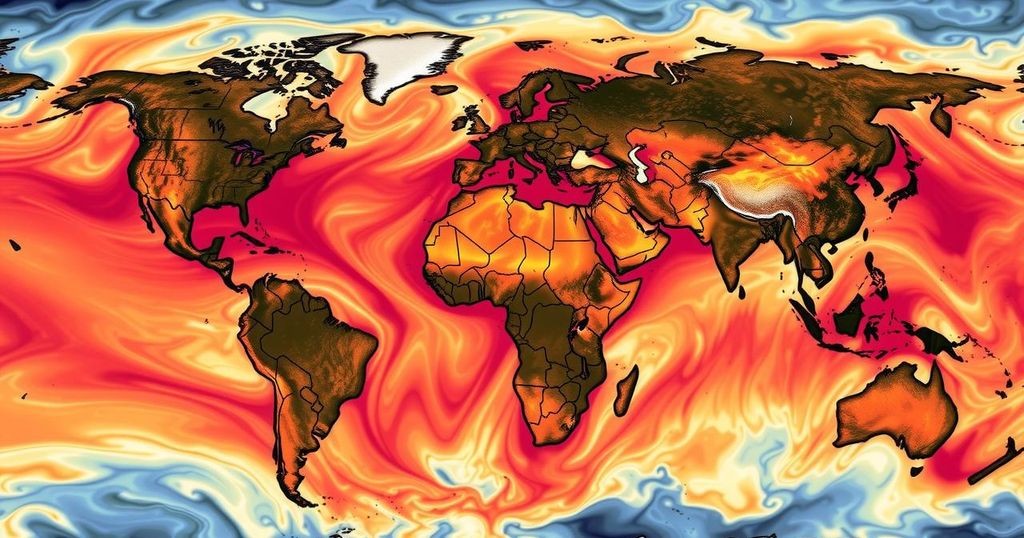Weather
AARON FAVILA, ANDY WONG, AP, ASIA, ATHENS, BEIJING, CENTRAL, CHINA, CLIMATE, CLIMATE CHANGE, COUNTY HOMELESS TRUST, CROSS, CUBA, EUROPE, FELIX MARQUEZ, GLOBAL WARMING, GREECE, LYNNE SLADKY, MIAMI - DADE COUNTY HOMELESS TRUST, NORTH AMERICA, PARTHENON, PHILIPPINES, PRIZES, QUEZON CITY, WEATHER
Marcus Chen
0 Comments
Climate Change Causes 41 Additional Days of Extreme Heat in 2024
Climate change has resulted in a staggering 41 additional days of extreme heat globally in 2024, contributing to significant weather-related fatalities and challenges. Research indicates that human activities are primarily responsible for these changes, making awareness and proactive adaptation critical to managing future impacts.
In 2024, global climate change resulted in an alarming average increase of 41 days of extreme heat, severely impacting populations worldwide, as reported by several climate researchers. This year marked a significant escalation in climate-related weather phenomena, making it likely that 2024 will be recorded as the hottest year to date. The analysis conducted by World Weather Attribution and Climate Central revealed that climate change significantly exacerbated adverse weather, with its effects evident in multiple regions experiencing intense heat waves, droughts, and severe storms.
Notable examples of this crisis included the extreme heat faced in regions such as Death Valley in Northern California, high temperatures in Central America, and educational disruptions in South and Southeast Asia due to soaring temperatures. On June 16, 2024, residents in Veracruz, Mexico, were compelled to gather water amidst severe drought conditions. Furthermore, scientists reported that some regions experienced over 150 days of extreme heat due to anthropogenic climate influence.
The consequences of these climate changes extend beyond discomfort, as heat-related fatalities often go unreported, masking the true scope of the crisis. Lead researcher Friederike Otto of World Weather Attribution emphasized, “Heat waves are by far the deadliest extreme event,” highlighting the urgent need for improved awareness and response strategies. Researchers noted that without significant reductions in greenhouse gas emissions, the situation is likely to deteriorate further, risking breaching the Paris Agreement’s 1.5 degrees Celsius warming target.
Additionally, the study examined extreme weather events that resulted in over 3,700 fatalities in 2024, establishing a connection between 26 of these events and climate change. The intertwining effects of climate change and natural phenomena such as El Niño were noted; however, the attributable impacts of climate change were deemed more substantial. A broader context of increasing carbon emissions was highlighted, underscoring the necessity for immediate action and adaptation to mitigate future impacts.
Crucially, experts assert that while the future may be daunting, strategic preparation and localized action can alleviate the dire consequences of extreme weather events. Julie Arrighi from the Red Cross Red Crescent Climate Centre stressed the role of nations in adapting to climate challenges, suggesting that effective solutions exist to counteract some of the severe impacts observed in 2024.
Since the advent of industrialization, anthropogenic climate change has led to a significant increase in global temperatures, impacting weather patterns, sea levels, and ecosystems. The year 2024 has been marked by unprecedented heat waves, droughts, and extreme weather conditions, raising alarms regarding human health and safety, economic stability, and environmental sustainability. Studies conducted by various climate research organizations have pointed to a clear link between greenhouse gas emissions from burning fossil fuels and the exacerbation of climate-related disasters. The urgency of addressing these issues aligns with global efforts stipulated by the Paris Agreement, which aims to limit further temperature increases.
In conclusion, the findings of research conducted in 2024 reveal the dire consequences of climate change on global weather patterns, evidenced by an alarming rise in extreme heat days. This situation necessitates immediate and coordinated global efforts to mitigate climate impacts and adapt to ongoing changes. The study highlights the critical nature of awareness and action to prevent future catastrophic consequences and points toward the essential role nations play in addressing and preparing for the multifaceted challenges posed by climate change.
Original Source: apnews.com




Post Comment